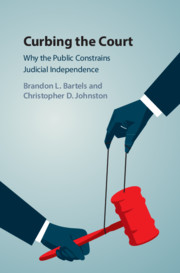Book contents
- Curbing the Court
- Curbing the Court
- Copyright page
- Dedication
- Contents
- Figures
- Tables
- Acknowledgments
- 1 The Guardians of Judicial Independence
- 2 Theories of Public Support for Court-Curbing
- 3 A Deep Dive into Supreme Court Evaluation and Support
- 4 General Policy Disagreement and Broadly Targeted Court-Curbing
- 5 Specific Policy Disagreement and Support for Court-Curbing
- 6 Partisan Polarization and Support for Court-Curbing
- 7 Procedural Perceptions and Motivated Reasoning
- 8 Reconsidering the Public Foundations of Judicial Independence
- References
- Index
5 - Specific Policy Disagreement and Support for Court-Curbing
Published online by Cambridge University Press: 14 August 2020
- Curbing the Court
- Curbing the Court
- Copyright page
- Dedication
- Contents
- Figures
- Tables
- Acknowledgments
- 1 The Guardians of Judicial Independence
- 2 Theories of Public Support for Court-Curbing
- 3 A Deep Dive into Supreme Court Evaluation and Support
- 4 General Policy Disagreement and Broadly Targeted Court-Curbing
- 5 Specific Policy Disagreement and Support for Court-Curbing
- 6 Partisan Polarization and Support for Court-Curbing
- 7 Procedural Perceptions and Motivated Reasoning
- 8 Reconsidering the Public Foundations of Judicial Independence
- References
- Index
Summary
Chapter 5 examines the effect of disagreement with specific Supreme Court ruling on support for both narrowly and broadly targeted Court-curbing. The chapter presents results from a national panel survey with waves surrounding some of the most important rulings in the contemporary era, including 2012’s health care ruling (NFIB v. Sebelius, upholding the Affordable Care Act), 2013’s rulings on the Voting Rights Act (Shelby County) and same-sex marriage (Windsor), and 2015’s landmark ruling declaring a constitutional right to same-sex marriage (Obergefell v. Hodges). The results demonstrate that citizens’ support for Court-curbing changes as a function of agreement and disagreement with salient rulings. The chapter also demonstrates that right-wing citizens are consistently more supportive of Court-curbing throughout the 2012–2016 period, suggesting that blockbuster liberal rulings during this period have had a substantial impact on mass perceptions of the Court’s ideological tenor. We also report the results from two original national survey experiments which show that the effect of policy disagreement is larger for narrow than broad Court-curbing.
Keywords
- Type
- Chapter
- Information
- Curbing the CourtWhy the Public Constrains Judicial Independence, pp. 126 - 174Publisher: Cambridge University PressPrint publication year: 2020

